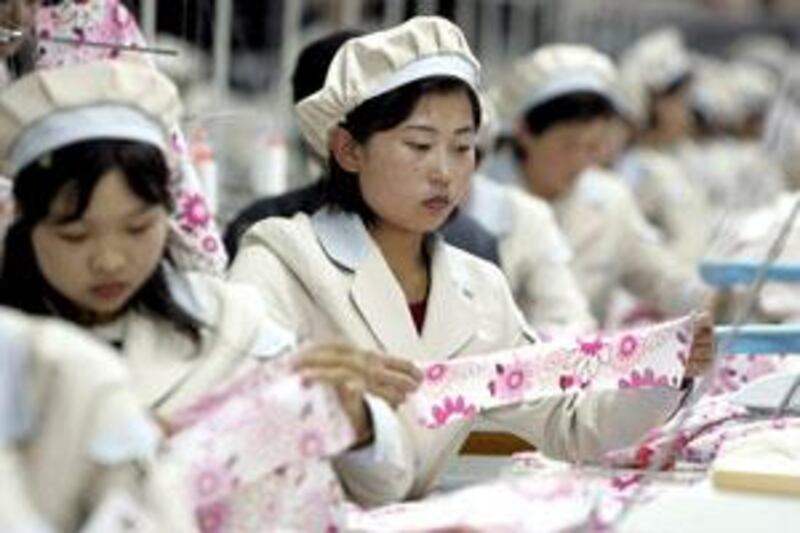How to explain North Korea's actions yesterday? Much of it is based on economics, but of the peculiarly North Korean variety. The arms trade has always been a rare source of hard currency earnings for the North. It sells small arms widely, with scant regard for politics. But bigger items are more lucrative. Not having joined the Missile Technology Control Regime, the Democratic People's Republic of Korea (DPRK), to use its official name, can and does quite legally sell missiles to anyone who will pay.
Despite denials, Iran's Shahab and Pakistan's Ghauri missiles are obviously based on North Korean designs. Another customer is Syria, a rare state that still recognises only North Korea, not the South. And missiles are one thing, but in 2007 Israel bombed a mystery plant being built in Syria's eastern desert; a plant that looks to have been a clone of the DPRK's plutonium site at Yongbyon. But it's not as if Pyongyang lacks other economic options than selling weapons. Thirty years after South Korea showed the way, North Korea now sends construction workers to the Middle East and elsewhere.
At home, in the Kaesong special zone, South Korean businesses hire cheap northern labour. All of these are win-win, legal situations. Yet the North has harassed Kaesong and now threatens to close it down completely. It is hard to imagine any company now willing to invest in the North. Then there are the other costs of its aggressive actions. Relations between the DPRK and Japan are at their lowest over unresolved past kidnappings. A new nuclear test will hardly help.
But if the North Korean leader Kim Jong-il chose to normalise ties with Tokyo, it could net him US$10 billion (Dh36.73bn) in aid: about half a year's GDP. A relieved South Korea and others would give generously, too. You'd think it was a given. As it stands, the grim path Mr Kim has chosen is driving his country and people to breaking point. It is hard to believe now that North Korea was once richer than the South, admired in the Non-Aligned Movement for its rapid early industrialisation and modest prosperity.
But from the late 1960s, Kim Il-sung, Mr Kim's father, chose guns over butter. Growth slowed as military spending crowded out civilian expenditure, with consumer goods and - fatefully - food sacrificed to build up an old-style, third-rate heavy industry for the army. Further unproductive spending on huge monuments and a cult of personality also sapped the once vibrant economy. In 1981, Moscow delivered the coup de grace, pulling the plug on all its clients. Some, such as Cuba, adapted, but Kim Il-sung seemed paralysed.
Without Soviet fuel and other aid, North Korean national income plunged by half in the 1990s. By 1996, this led to a terrible famine. Perhaps a million of the North's 23 million people died. More than a decade later, despite half-baked reforms in 2002, hunger is still the lot of most North Koreans, who are now visibly smaller than their southern brethren. The UN World Food Programme once had its largest operation anywhere in the DPRK, until a suspicious government reined them in. Anyway, who will offer food aid to a defiant nuclear power?
South Korea used to donate half a million tonnes of rice and much fertiliser annually. But a new conservative government in Seoul has halted this, insisting on nuclear compliance first. Although short-sighted and tactically mistaken, the South's frustration is understandable. No one likes being taken for a ride. North Korea threatens and takes, but never delivers. Need we care? East Asian stock markets, long inured to Pyongyang's antics, wobbled briefly on the news of yesterday's nuclear test but rapidly recovered. Even Seoul's Kospi, which initially fell 6 per cent, closed down just 0.2 per cent.
The real fear is that militancy is so hard-wired into the DPRK that it genuinely cannot contemplate any other way. Other Asian communist regimes, in China and Vietnam, have kept power by embracing market forces, and they have flourished. But North Korea is trying to curb the private markets that are all that keep most of its people from starving. At home and abroad, this is a regime on a road to nothing and nowhere. North Korea's dogged survival, 20 years after most other communist regimes elsewhere collapsed or mutated, is remarkable. Yet so self-defeating a modus operandi cannot endure indefinitely. Tensions and contradictions, within and without, will only grow more acute.
Karl Marx famously argued that the economic base determines the political superstructure. North Korea, forsaking Marx, has this back-to-front. Kim Jong-il's choosing guns means no butter for his subjects - indeed, little food of any kind, nor any investment in a better future. This is the perverse economics behind yesterday's news. South Korea, even in a downturn, trades more in two days than the North in a whole year.
Aidan Foster-Carter is an honorary senior research fellow in sociology and modern Korea at Leeds University in the UK





